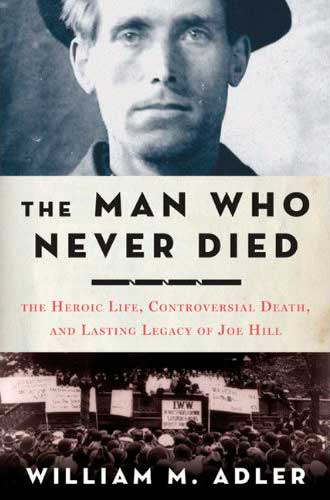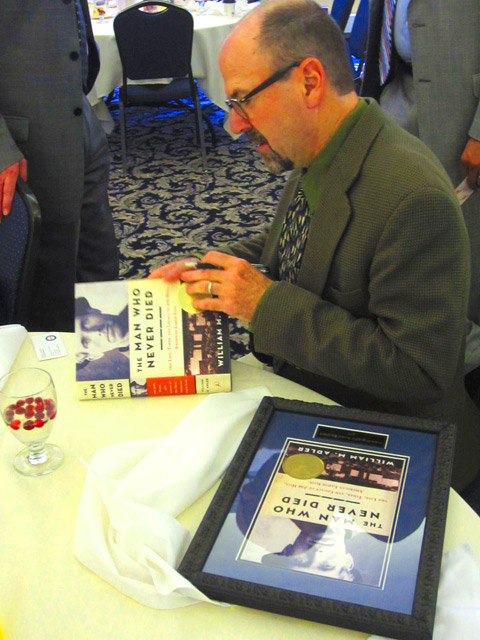The saga of labor activist Joe Hill, executed in Utah, wins Evans prize
September 24th, 2012 Posted in OpinionStory & Photos by D. Whitney Smith
LOGAN—It’s a true story about attempted murder, possible sex scandal, crooked cops and death by firing squad—and that’s just what happened in Utah. Journalist and historian William Adler, whose biography about union songwriter Joe Hill won USU’s $10,000 Evan’s Biography Award, was on campus Friday.

William Adler’s biography of songwriter and labor activist Joe Hill, executed by a Utah firing squad in 1915, is winner of the 2011 Evans Biography Award.
Adler’s book, The Man Who Never Died: The Life, Times, and Legacy of Joe Hill, American Labor Icon, was named the winner of the 2011 Evans Biography Award, sponsored by USU’s Mountain West Center.
Prior to the awards luncheon, Adler regaled students, faculty and community members Friday morning in the Merrill-Cazier Library with the story behind his research on Hill, including the events that led up to Hill allegedly being framed by Utah authorities and then executed by a Utah firing squad in 1915.
• Read Adler’s own commentary on Joe Hill in the Los Angeles Times.
Hill became so legendary that Alfred Hayes wrote a song about him, “Joe Hill,” with music composed by Earl Robinson. Many musicians have emulated Hill, including Bob Dylan, Joan Baez, Ani DiFranco and Woody Guthrie, and Adler, a veteran journalist who lives in Costa Rica, said he wanted to investigate this “making of a folk hero.”
“While I knew a lot about Woody Guthrie,” Adler said, “I knew nothing about Joe Hill, other than what was in that folk song. I didn’t know where the myth ended and the man began, and I wanted to really learn more about him. It was the story of the murder that first attracted me.
“I got onto this story initially as a murder mystery,” he said. “I probably watched too much CSI, but it just seemed like I could be the detective writer and I could go and pry open this cold case and try to solve it.”
Eventually, Adler said he realized there’s much more to Hill’s colorful past—it goes far beyond a murder mystery.
“In fact, the murder was beside the point ultimately,” Adler said. “Hill, as one of his friends said, ‘Earned his mythology the hard way.’ So I wanted to see exactly how he did earn that mythology. One of the more surprising things I learned doing this book was how Hill himself was complicit in his legend-making. He really had achieved legendary status, even before he was executed.”
Hill, a Swedish immigrant who made his living in early 20th century America writing songs for an up-and-coming labor union, the Industrial Workers of the World (IWW), eventually met his fate at the receiving end of a Utah firing squad on Nov. 19, 1915.
The IWW came as an answer to the American Federation of Labor, which in the early 1900s closed its doors to any worker who wasn’t a native, white American man. Therefore, immigrants, women, and men of color were drawn to the IWW, a perfect fit for Hill, who became a prominent songwriter and organizer for the outfit.

Author William Adler signs a copy of his biography of Joe Hill at Friday’s award ceremonies at USU. Dan Smith photo
Not long before his execution, according to Adler’s book, Hill had survived a gunshot wound inflicted by his friend Otto Applequist, who in a “fit of anger” accused Hill of trying to steal his fiancée. He had also been tarred and feathered multiple times by strikebreakers and police officers harboring anti-union sentiments.
Adler began work on the Hill biography in 2006, when his son was only a year old. He said it felt as though he lived in his basement and when he finally finished the manuscript and “emerged from the basement,” his son was 6.
“I was so immersed in this work that there were times . . . it went by in a flash, but there were times it just felt like there was nothing else in the world, which isn’t really an admirable thing to say, necessarily,” Adler said. “It just took everything that I could put into it to do this book, and it’s wonderful to be recognized.”
USU’s Mountain West Center for Regional Studies and the Evans Regional Jury chooses finalists for the award and then appoints a winner for the Evans Biography Award, which is one of two books awards given annually bearing the Evans name.
“In short, the ‘Man Who Never Died’ is a wonderful book, in every respect,” Phillip Snyder, an associate Brigham Young University English professor, said Friday afternoon at the Evans Award luncheon at the USU Alumni House.
Following the luncheon, Snyder, a member of the Evans Regional Jury, presented Adler with the $10,000 check.
“Adler effectively recreates the textures and nuances of the sociopolitical climate of the time on local, national and even international fronts,” Snyder said, regarding the skill with which Adler crafted Hill’s biography. “When I discuss composing titles with my students, I usually say that the sexy, attention-getting part goes before the colon, and the serious description part goes after the colon. [Adler’s book] is a perfect illustration of what I mean.”
In addition to Adler’s award, Alwin J. Girdner won the 2011 Evans Handcart Award and $2,500 prize Friday for his ethnography, Diné Tah: My Reservation Days 1923-1939.
• See Natasha Bodily’s story on Alwin Girdner’s book here.
The Evans Handcart Award and Evans Biography Award are made possible by endowments from the David Woolley Evans and Beatrice Cannon Evans family.
John Allen, dean of the College of Humanities and Social Sciences, said at the luncheon that members of the Evans family recently donated an additional $100,000 to perpetuate the Evans awards fund with a total endowment of $500,000.
TP
Tags: Alwin Girdner, Evan Book Award, Joe Hill, Mountain West Center, William Adler

1 Trackback(s)
Sorry, comments for this entry are closed at this time.